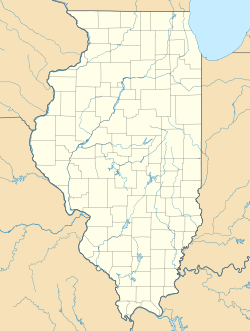Rosamond, Illinois facts for kids
Quick facts for kids
Rosamond, Illinois
|
|
|---|---|
| Country | United States |
| State | Illinois |
| County | Christian |
| Elevation | 709 ft (216 m) |
| Time zone | UTC-6 (Central (CST)) |
| • Summer (DST) | UTC-5 (CDT) |
| ZIP code |
62083
|
| Area code(s) | 217 |
| GNIS feature ID | 416931 |
Rosamond is a small, unincorporated community located in Christian County, Illinois, United States. An unincorporated community means it's a place with a shared identity, but it doesn't have its own local government like a city or town. It's part of a larger county or township. Rosamond is found at 39°22′48″N 89°09′43″W / 39.380°N 89.162°W.
Discovering Rosamond's Past
Rosamond has a rich history, starting with its first settlers who helped build the community from the ground up. Let's explore how this area grew over the years!
Early Settlers and Farming Life
The story of Rosamond begins in 1856 when Captain Alfred Cowgill became one of the first known residents. He was involved in the grain business, which was very important for farmers in the area. He worked with different companies, helping to manage the grain trade.
In the same year, two more important people arrived: L.S. Gardner and Orlando Manvill Hawkes. Gardner started as a farmer, turning the land into productive fields. Later, as Rosamond grew, he and his wife helped manage a "Poor Farm." This was a place where people who needed help could live and work. Hawkes was also a farmer and was part of the First Congregational Church of Rosamond.
Just a year later, in 1857, Wesley Simpson arrived. He was a hardworking farmer who transformed huge areas of prairie land into farms. Imagine turning wild grasslands into fields ready for planting!
Growing the Community and Local Businesses
More settlers came to Rosamond in the years that followed. In 1865, Phineas Leech Dodge arrived. By 1880, he owned the local grain elevator, which is a tall building used to store grain. This was a key business for the farming community. Dodge was also a member of the First Congregational Church.
The church continued to be an important part of the community. In 1866, Lyman Wilcox joined the church and served as a Sunday School leader for an amazing sixty years! He was a lifelong farmer, too.
In 1867, William W. Bailey began farming about 200 acres (0.81 km2) of land in the area. By 1868, Rosamond had important local officials: Charles H. Hill served as both a Justice of the Peace (someone who handles minor legal matters) and a Notary Public (someone who can legally witness signatures).
Other farmers who helped shape Rosamond include C.G. Richards, who arrived in 1868 and was a Deacon and Trustee at the church. Benjamin Franklin Carper arrived in 1869 and became known for raising livestock. Robert Watt bought his farm in Rosamond in 1872, and William Grimes started farming in 1873.
Moses Hutchins arrived in 1875 and also focused on raising livestock. He joined the First Congregational Church and served as a Trustee.
In 1881, J.B. Waddington came to Rosamond. Besides farming, he also opened his own grain elevator, adding to the local businesses that supported the community's growth. These early settlers and their hard work laid the foundation for Rosamond.



